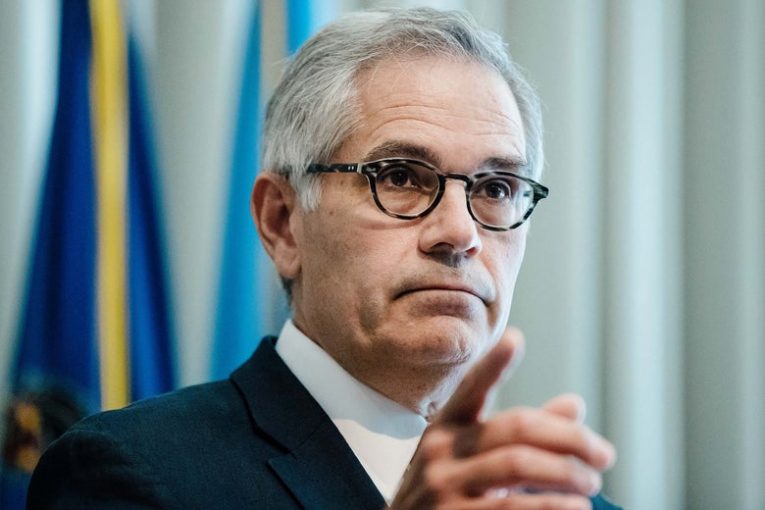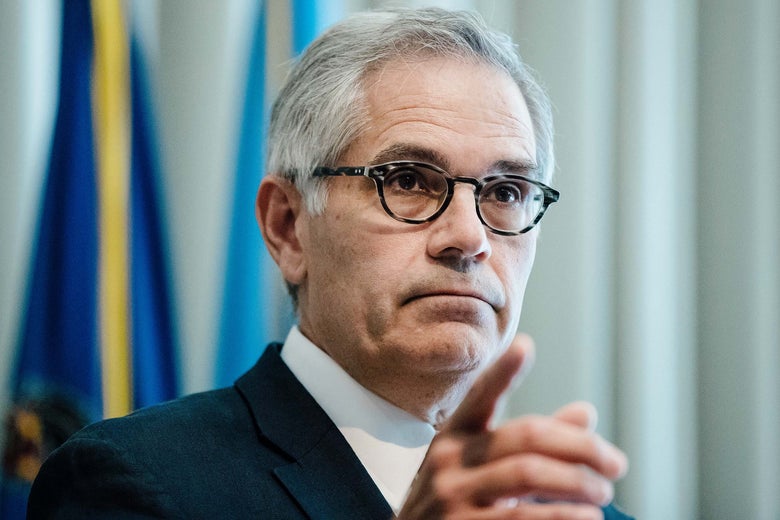

By Julietta Bisharyan
PHILADELPHIA –– On Wednesday, District Attorney Larry Krasner called on Pennsylvania Governor Tom Wolf to use his power to pardon incarcerated people, especially those with compromised immune systems, in the hopes of stopping the spread of COVID-19 in the state’s communities.
He conveyed concern at the state officials’ hesitancy in protecting individuals currently held and working at state prisons.
“Pennsylvania continues to lag behind other states in safely reducing county jail and state prisons populations, just as we have confirmation of COVID-19 cases in all 67 counties,” he said. “We must prevent from happening in Pennsylvania what has been happening at New York’s Rikers Island, where COVID-19 has been spreading more than 85 times faster than the average rate of infection in the U.S.”
Earlier in the week, Riker’s Island lost its first incarcerated person, 53-year old Michael Tyson, to the coronavirus following Governor Andrew Cuomo’s release order for vulnerable individuals. Tyson’s name was one of many on the list of detainees seeking immediate release through the Legal Aid Society’s lawsuit.
The Department of Corrections and Community Supervision confirmed over 400 positive cases in New York prison systems, including incarcerated individuals, parolees and employees. In Philadelphia, over 31 people in the jails have fallen ill with the virus. The number was only two just a week ago.
“We really need the courts to be more open to considering the direness of the situation,” said Keir Bradford-Grey, the city’s chief public defender. “The prison positive tests are growing rapidly day by day. There is no way to social distance in jails and [those numbers are] going to continue to rise. We can’t wait until next Tuesday.”
About 45,000 people, considered vulnerable due to health and age by the Pennsylvania Department of Corrections (PADOC), are being held in 25 state prisons. All ventilators owned by the PADOC are  currently in use.
currently in use.
In response to the American Civil Liberties Union’s lawsuit against the Weld County Sheriff, the state Supreme Court ordered presiding judges in every county to monitor the adherence to COVID-19 public health guidelines, which include public distancing. If the facilities fail to comply, the justices recommend that the county courts consider certain low-level offenders, pre-trial detainees and vulnerable incarcerated people for potential release.
Still, District Attorney Krasner and Bradford-Grey expressed concern, asserting that the process would not be fast enough to narrow down the jail population and ultimately prevent crisis.
“We want now, and we have wanted all along, to move efficiently with the First Judicial District and all the other stakeholders to make progress,” said District Attorney Krasner. “Sometimes progress in Philly takes a little longer than it should.”
According to the Office of General Counsel, Governor Wolf has the power to grant reprieve, which will issue temporary suspensions of prison sentence. Deputy General Counsel Anne Cornick, however, wrote that “it was not the preference” for Wolf to use the reprieve power.
Those released by reprieve would be incentivized to return after the COVID-19 pandemic through favorable consideration at their first parole hearing. Individuals who fail to return to facilities would be subject to parole violations or other additional punishments.
“This week, a gutless legislative solution failed to gain traction in the Pennsylvania General Assembly. It was written to fail to reduce prison populations,” says District Attorney Krasner. “This morning, Pennsylvania House Republicans admitted that their overtures toward protecting communities from COVID-19 were completely in bad faith.”
Over 30 public health professionals and experts also wrote a letter to Governor Wolf, imploring him to use his reprieve and emergency powers to decrease the population of people incarcerated in the Pennsylvania Department of Corrections. If Governor Wolf does not act quickly, they warn that the virus will not only spread in the state prisons, but in the rural communities where the facilities are located.
“Before it is too late, every effort should be made to decrease the prison population so that social distancing can be possible,” the letter reads. “Other countries, states, and jurisdictions have enacted decarceration to stop the spread of COVID-19. Pennsylvania must do the same.”
The overcrowding in the 27 prisons across the state makes it nearly impossible to practice social distancing as recommended by the Centers for Disease Control and Prevention. As a result, the virus is more likely to spread, creating a “looming disaster.”
The letter ends by urging Governor Wolf to use his reprieve powers, ensure continuity of care, and to encourage and sign legislation that will reduce the prison population.
In addition, the social media campaign, #IAmAHomePlan, shared by justice organizers across Commonwealth, also called on Governor Wolf to take action.
About 20,000 individuals are held at minimum custody in Pennsylvania’s state prisons. In other words, the majority of incarcerated people are those who pose the least threat to public safety.
“Jails and prisons are already dirty, crowded places,” said Krasner in a statement. “The elected and appointed leaders of the Commonwealth must protect us all by moving forward with safe and timely release of people from corrections facilities who are unlikely to endanger the public.”
To sign up for our new newsletter – Everyday Injustice – https://tinyurl.com/yyultcf9
